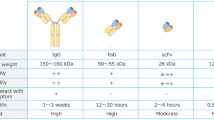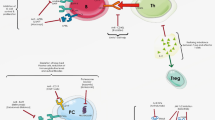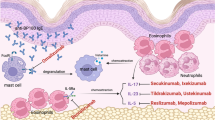Abstract
▴ Certolizumab pegol is a pegylated humanized Fab′ fragment of an anti-tumor necrosis factor-α (TNFα) monoclonal antibody, which binds with high affinity to both membrane-bound and soluble TNFα and demonstrates high neutralizing potency for these factors.
▴ The elimination half-life of certolizumab in humans has been extended to ≈2 weeks through pegylation, allowing subcutaneous administration of this agent once every 4 weeks.
▴ Subcutaneous certolizumab pegol 400mg once every 4 weeks (with an additional 400mg dose at week 2) was effective as induction and maintenance therapy in patients with moderate to severe Crohn’s disease in whom baseline serum C-reactive protein levels were ≥10 mg/L, according to data from two well designed, randomized phase III trials.
▴ Certolizumab pegol was, in general, well tolerated, and adverse events associated with the drug were of a mild to moderate nature; no instances of lupus were reported in any of the trials.




Similar content being viewed by others
Notes
The use of trade names is for product identification purposes only and does not imply endorsement.
References
Anon. Countering Crohn’s disease with Cimzia: novel TNF-α blocker close to market. Pharm Diag Innovation 2005; 3 (8): 6-9
Sandborn WJ. New concepts in anti-tumor necrosis factor therapy for inflammatory bowel disease. Rev Gastroenterol Disord 2005; 5(1): 10–8
Schreiber S, Rutgeerts P, Fedorak RN, et al. A randomized, placebo-controlled trial of certolizumab pegol (CDP870) for treatment of Crohn’s disease. Gastroenterology 2005 Sep; 129(3): 807–18
Feagan B, Rutgeerts P, Schreiber S, et al. Low baseline CRP correlates with a high placebo remission rate in Crohn’s disease (CD) clinical trial at 12 weeks [abstract no. M1092]. Gastroenterology 2005; 128Suppl. 2: 307
Vermeire S, Van Assche G, Rutgeerts P. C-reactive protein as a marker for inflammatory bowel disease. Inflamm Bowel Dis 2004 Sep; 10(5): 661–5
Weir N, Athwal D, Brown D, et al. A new generation of high-affinity humanized PEGylated Fab′ fragment anti-tumor necrosis factor-alpha monoclonal antibodies. Therapy 2006; 3(4): 535–45
US Food and Drug Administration. FDA Approves new treatment For Crohn’s disease [online]. Available from URL: http://www.fda.gov/bbs/topics/NEWS/2007/NEW01572.html [Accessed 2007 May 15]
Choy EH, Hazleman B, Smith M, et al. Efficacy of a novel PEGylated humanized anti-TNF fragment (CDP870) in patients with rheumatoid arthritis: a phase II double-blinded, randomized, dose-escalating trial. Rheumatology (Oxford) 2002 Oct; 41(10): 1133–7
Fossati G, Nesbitt A. Effect of the anti-TNF agents, adalimumab, etanercept, infliximab, and certolizumab pegol (CDP870) on the induction of apoptosis in activated peripheral blood lymphocytes and monocytes. Am J Gastroenterol 2005; 100Suppl. 9: 298–9
Gramlick G, Fossati G, Nesbitt A. Neutralization of soluble and membrane tumor necrosis factor-α (TNF-α) by infliximab, adalimumab, or certolizumab pegol using P55 or P75 TNF-α receptor-specific bioassays. Gastroenterology 2006; 130Suppl. 2: A–697
Gramlick G, Fossati G, Henry A, et al. Assessment of the affinity for soluble TNF and the neutralising potency against soluble and membrane TNF of the anti-TNF agents certolizumab pegol, adalimumab, etanercept and infliximab. Ann Rheum Dis 2006; 65Suppl. II: 456
Vetterlein OM, Kopotsha T, Nesbitt AM, et al. Antibodies to infliximab in patients with Crohn’s disease do not cross-react with certolizumab pegol [abstract no. MON-G-261]. Gut 2006; 55 (Suppl. V): A133. Plus poster presented at the 14th United European Gastroenterology Week; 2006 Oct 21–25; Berlin
Sandborn WJ, Feagan BG, Stoinov S, et al. Certolizumab pegol administered subcutaneously is effective and well tolerated in patients with active Crohn’s disease: results from a 26-week, placebo-controlled phase III study (PRECiSE I) [abstract no. 745]. Gastroenterology 2006 Apr; 130 (4 Suppl. 2): 107. Plus oral presentation presented at Digestive Disease Week; 2006 May 20–25; Los Angeles
Schreiber S, Feagan B, Hanauer SB, et al. Safety and tolerability of subcutaneous certolizumab pegol in active Crohn’s disease: results from two phase III studies (PRECiSE program) [abstract no. 1126]. Gastroenterology 2006 Apr; 130 (4 Suppl. 2): 479. Plus poster presented at Digestive Disease Week; 2006 May 20–25; Los Angeles
Baker M, Stringer F, Stephens, S. Pharmacokinetic properties of the anti-TNF agent certolizumab pegol [abstract no. THU0195]. Ann Rheum Dis 2006; (65 Suppl. 2): 175. Plus poster presented at the Annual European Congress of Rheumatology; 2006 Jun 21–24; Amsterdam
Schreiber S, Khaliq-Kareemi M, Lawrance I, et al. Certolizumab pegol, a pegylated Fab′ fragment of a humanised anti-tnf monoclonal antibody, is safe and effective in the maintenance of response and remission following induction in active Crohn’s disease: a phase III study (PRECISE 2) [abstract no. SAT0168]. Ann Rheum Dis 2006; 65Suppl. II: 500
Guyatt G, Mitchell A, Irvine EJ, et al. A new measure of health status for clinical trials in inflammatory bowel disease. Gastroenterology 1989 Mar; 96(3): 804–10
Rutgeerts P, Fedorak R, Schreiber S, et al. CDP870, a pegylated humanized anti-TNF antibody fragment, improves quality of life in patients with moderate to severe Crohn’s disease [abstract no. T1306]. Gastroenterology 2004 Apr; 126(4 Suppl. 2): A–466
Winter TA, Wright J, Ghosh S, et al. Intravenous CDP870, a PEGylated Fab′ fragment of a humanized antitumour necrosis factor antibody, in patients with moderate-to-severe Crohn’s disease: an exploratory study. Aliment Pharmacol Ther 2004 Dec; 20(11–12): 1337–46
Feagan B, Coteur G, Keninger DL, et al. Sustained improvement in health-related quality of life following certolizumab pegol 400mg every 4 weeks in patients with crohn’s disease: data from PRECiSE 2 [abstract no. MON-G-219]. Gut 2006; 55 (Suppl. V): A124. Plus poster presented at the 14th United European Gastroenterology Week; 2006 Oct 21–25; Berlin
Feagan B, Coteur G, Keninger DL, et al. The burden of Crohn’s disease on patients-reported health status was relieved following maintenance treatment with certolizumab pegol 400mg every 4 weeks: data from PRECiSE 2 [abstract no. MON-G-220]. Gut 2006; 55 (Suppl. V): A124. Plus poster presented at the 14th United European Gastroenterology Week; 2006 Oct 21–25; Berlin
Feagan B, Brown M, Gerlier L, et al. The effects of certolizumab pegol on work productivity and daily activities of Crohn’s disease patients: data from PRECiSE 2 [abstract no. MON-G-291]. Gut 2006; 55 (Suppl. V): A139. Plus poster presented at the 14th United European Gastroenterology Week; 2006 Oct 21–25; Berlin
Schreiber S, Colombel JF, Panes J, et al. Recent-onset Crohn’s disease shows higher remission rates and durability of response to treatment with subcutaneous monthly certolizumab pegol: results from an analysis of the PRECiSE 2 phase III study [abstract no. MON-G-255]. Gut 2006; 55 (Suppl V): A131. Plus poster presented at the 14th United European Gastroenterology Week; 2006 Oct 21–25; Berlin
Schreiber S, Winter T, Innes A, et al. Safety of CDP870, a pegylated humanised anti-TNF antibody fragment, in Crohn’s disease. Gut 2003 Nov; 52Suppl. 6: 215
Author information
Authors and Affiliations
Corresponding author
Rights and permissions
About this article
Cite this article
Blick, S.K., Curran, M.P. Certolizumab Pegol. BioDrugs 21, 195–201 (2007). https://doi.org/10.2165/00063030-200721030-00006
Published:
Issue Date:
DOI: https://doi.org/10.2165/00063030-200721030-00006




